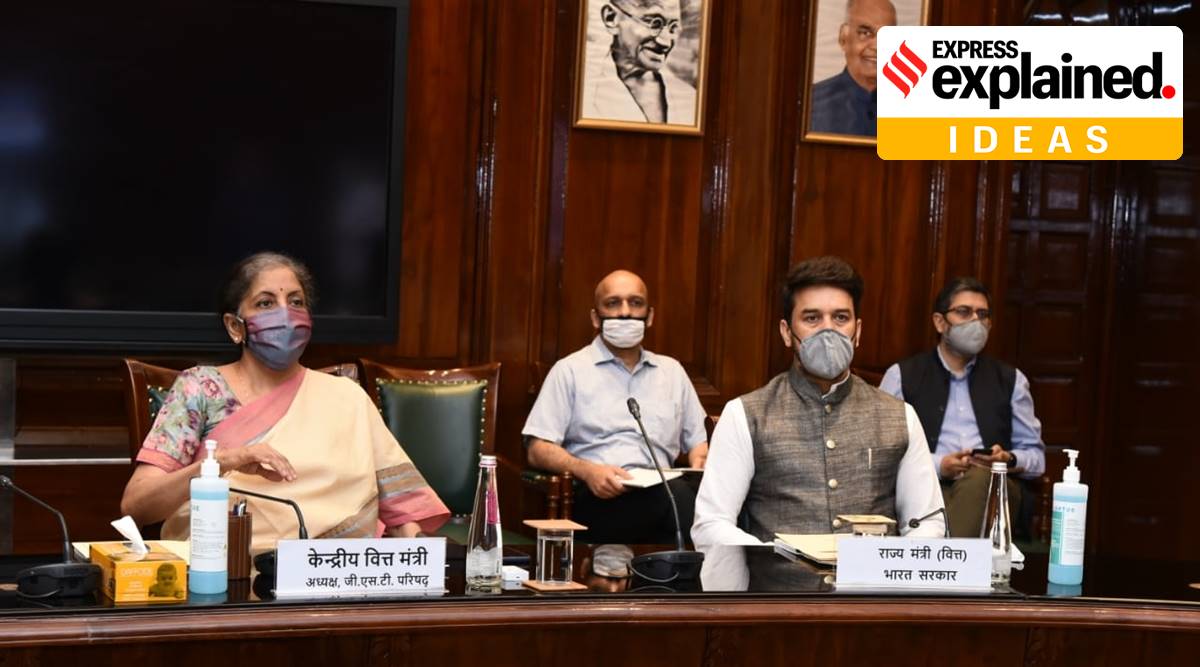Explained Ideas: Why states borrowing money to make up for gap in GST revenues is the right way forward
Sushil Kumar Modi writes: The GST Council had agreed that the means of financing the shortfall are to be decided by the Council and not by the Government of India.
 Finance Minister Nirmala Sitharaman with MoS (Finance) Anurag Thakur at the GST Council meeting last month. Modi writes that the Centre has already breached the budgeted borrowing limits for the current year in the first four months itself. (Photo: (Twitter/Ministry of Finance)
Finance Minister Nirmala Sitharaman with MoS (Finance) Anurag Thakur at the GST Council meeting last month. Modi writes that the Centre has already breached the budgeted borrowing limits for the current year in the first four months itself. (Photo: (Twitter/Ministry of Finance)The Covid pandemic has played havoc with the economy. Revenue streams of the government, the private sector and individuals have been severely impacted while the expenditure, particularly of the government, is shooting up with a rise in commitments.
One significant area of loss of revenue to both the Centre and the states is GST. But “while the states have the comfort of assured 14 per cent growth through the compensation mechanism, the Centre has no such guarantee,” writes Sushil Kumar Modi, the deputy chief minister of Bihar, in an opinion piece in The Indian Express.
The Compensation Act mandates compensating the states for revenue loss on GST implementation from the Compensation Fund.
Modi quotes former Finance Minister, the late Arun Jaitley, to make his point. Jaitley had said that “in case the amount in the GST Compensation Fund fell short of the compensation payable, the GST Council shall decide the mode of raising additional resources including borrowing from the market which could be repaid by collection of cess in the sixth year or further subsequent years”.
“The Council had agreed to this suggestion. Quite clearly, the sense of the house and, consequently, the decision of the Council, was that it is the Council (and not the Government of India) that shall decide the mode of raising additional resources in the event of a shortfall,” writes Modi.
Additional resources could be raised by increasing the tax or the cess but in the present difficult times it would not be advisable to raise the burden of either the tax or the cess; if anything, it is the time to mitigate the burden on the common man. Hence, the only way out of this difficult situation is borrowings.
📣 Express Explained is now on Telegram. Click here to join our channel (@ieexplained) and stay updated with the latest
The question is: Who should borrow — the Centre or the states?
Modi asserts that it would be “financially imprudent for the Centre to borrow since large borrowings by the Centre would push up the bond yield rates, which in turn would push up the bond yield of the states setting off a spiral leading to hike in the interest rates for businesses and individuals. The states’ borrowing would become costlier if the Centre were to borrow for this purpose”.
Also read | Four reasons why farmers are feeling cheated by the govt’s policies
He writes that the Centre has already breached the budgeted borrowing limits for the current year in the first four months itself. Thus, he believes, it makes sense for the states to borrow.
“I think the states should come forward and work with the Centre in the true spirit of cooperative federalism that the Council has come to be known for these past few years,” he concludes.
- 01
- 02
- 03
- 04
- 05






































